
The guy assured us his bus was going directly to Merida and would get there by 4pm. It didn't on both accounts. We ended up in some funny little town two hours late and 2 hours away from Merida
 Tarmacing Venzuela style
Tarmacing Venzuela style
It was 9pm when we eventually got to a hotel. We had no money and spent the rest of the evening hungry and trying, without success, to find a working ATM.
Next morning we tried every ATM in town. None worked with our cards.
Went to all the banks. They looked at our cards as if they were contaminated and told us to go to a different bank any bank but not theirs. We were tired, hungry, fed up, hot, suffering from pollution and desperate for a beer.

We eventually found a bank that accepted visa but its system was crazy. Over the next two days we spent 8 hours queueing.

To top it all we found out that if we had Dollars we could cash them just about anywhere and get black market rate that made everything half price. This changes Venezuela from South America´s most expensive country to its cheapest
This is the first time in all our travels that we have had trouble getting money. Suddenly it is no fun when you have no money for drinks, food or hotel

Merida has 3 Guinness Book of Records records. Highest cable car, longest cable car and the ice cream parlour with the most flavours - over 800 a lot of them,


Having had a tuna ice cream, we decided to get out of Venezuela and go to Brazil 35 hours away by bus. The first leg is a 14 hour night bus. It was due to leave at midnight but turned up at 1.30am. We had to hang around in the bus station with people coming up to us and telling us we should´t be there because it was very dangerous. Occasionally the police would walk past and hassle us, telling us to move our bags or asking us for the 20th time where we had come from and where we were going.

The bus was comfortable but we were woken up 4 times by National Guard and Police boarding the bus, searching bags and asking to see identity papers. At one stage the guy looked at my passport with the gaze of a confused dog. He then took it away and 10 minutes later told me to get off the bus. In the middle of nowhere there were 4 National Guard trying, for some reason, to decipher our Indian Visas. They were getting quite stroppy when Marilyn suddenly realised they were looking for the visa waivers which are on separate bits of paper. On seeing these the got very happy, shook hands and let us back on the bus. Nice ending but I think we were close to being arrested.
At the last check point a 'military' nurse came on board demanding to see Yellow Fever vaccine papers. I was very impressed when Marilyn produced our 8 year old certificates. Those who didn't have them were hearded off and given jabs.
With the exception of Venezuela the people we have
encountered seem happy and positive about the future. It feels as if they
believe that their horrific past is over and things are getting better. People
in Venezuela
seem depressed and stressed; it is as if they know their country is going
backwards.
We have always
rather liked Chavez and his outspokenness but visiting his country and talking
to the people have made us realise he is no joke. We do however realise that we
are talking to the wealthier people often the ones working in the tourist trade
Reasons to go off Chavez
1. When he came to
power he said "even if my father stole one Bolivar I would put him into
prison" Now his father is a state Governor and his family are very, very
wealthy
2. His famous red
shirt is actually a bullet proof vest made by a guy in Colombia
3. He is trying to
create conflict with Colombia.
Simon Bolivar died of tuberculosis but Chavez set up a commission to ´prove
that the Colombians killed him. The commission has no historians or medical
experts
4. The prices of
all basic commodities, including toilet paper, are fixed but at a price below
cost. Consequently, there is a shortage of everything you need. Queues form
outside government shops at 4am if there is a rumour of a delivery
5. Prices outside Government
shops are at European levels. No ordinary Ecuadorian can afford them
6 A German couple we stayed with had to give up a Sunday classical recital because it was overrun by Secret police who reported the people who attended
Enough Venezuela, looking forward to Brazil
 2hours from the road by boat
2hours from the road by boat
 Cheese making
Cheese making River Dolphin
River Dolphin
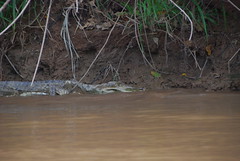
 This fellow suddenly wriggled, landed in the boat and scooted towards Marilyn. Marilyn - 'where did he go, arrhhhh he's touching my leg'
This fellow suddenly wriggled, landed in the boat and scooted towards Marilyn. Marilyn - 'where did he go, arrhhhh he's touching my leg'

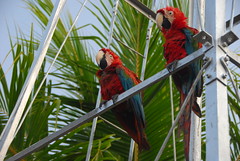



 Broke Back Mountain II - Born to the saddle
Broke Back Mountain II - Born to the saddle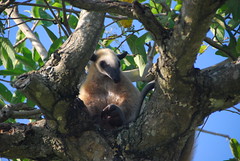

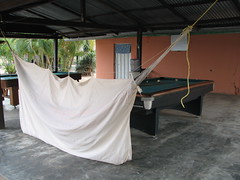 Bed once the locals had finished pool
Bed once the locals had finished pool
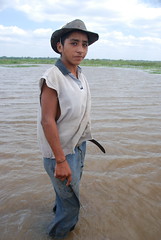
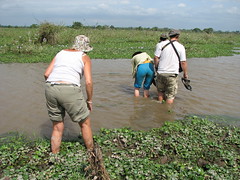

 Tarmacing Venzuela style
Tarmacing Venzuela style







 Biggest lake in South America but completely poluted
Biggest lake in South America but completely poluted

 How dangerous can a country be with these on the streets
How dangerous can a country be with these on the streets
 Crowd control
Crowd control




 Marilyn´s new friend helping her choose her emeralds (or glass chips!!)
Marilyn´s new friend helping her choose her emeralds (or glass chips!!)






